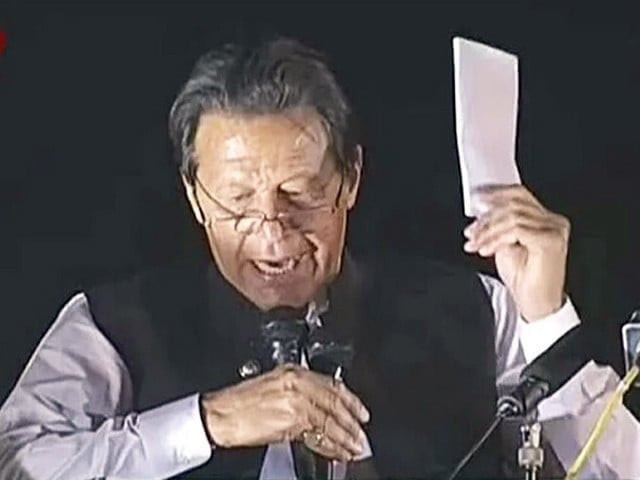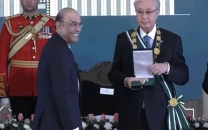Length of penalty in cypher case baffles IHC
Bench says maximum two-year sentence prescribed for copy loss

An Islamabad High Court (IHC) bench hearing appeals of former prime minister Imran Khan and former foreign minister Shah Mahmood Qureshi against their conviction in the cipher case was informed on Thursday that the case was not about losing the original cipher but a copy of it.
The lawyer for the appellants, Barrister Salman Safdar, said that when a cipher was lost, the Intelligence Bureau (IB) and senior security officials had to be informed about it. As per the law, he added, the time period for returning the cipher copy was one year.
The bench, led by Chief Justice Aamer Farooq and Justice Miangul Hassan Aurangzeb, heard the appeal against the sentence awarded to Imran and Qureshi. During the hearing, lawyer Salman Safdar continued his arguments.
On January 30, a special court convicted Imran and Qureshi in a case related to the misuse of a diplomatic cipher during the final days of the PTI government in March 2022, sentencing each of them to 10 years in prison under the Official Secrets Act (OSA), 1923.
Continuing his arguments on the appeals, Safdar explained that eight copies of the cipher were made and distributed to different people. According to the former secretary to the prime minister, one copy was given to the then prime minister, which had been lost.
Safdar said that the PTI founder was convicted under both clauses about negligent and willful loss of documents. The chief justice noted that punishment could not be awarded under both sections of the OSA, adding that it would be either Section 5(1)C or 5(1)D.
The lawyer said that normally, the copy of the cipher was returned to the Foreign Office within a period of one year. But in this case, he added, notice was given after seven months, while a criminal case was also lodged without any departmental inquiry.
Justice Miangul Hassan Aurangzeb asked the lawyer on which document he relied to state that the cipher copy was to be returned in one year. Safdar replied that, as per the record, one of the witnesses had said that the general practice was that the copy was to be returned in one year.
Safdar continued that there was no document on record to show that the copy had to be returned within one year. He added that then foreign secretary Sohail Mehmood had said in a statement that the prime minister's cipher copy had been lost.
According to Sohail Mahmood, the lawyer said, Azam Khan, the then principle secretary to the prime minister, had asked him for a new copy of the cipher, but the then secretary declined the request, saying that he should look for their own copy, as a new copy could not be issued.
On that, Justice Miangul Hassan Aurangzeb remarked that Azam Khan was the only witness to the handing over of the cipher copy to Imran, adding that if Azam Khan’s statement was removed, then there would be no witness.
Safdar mentioned that there was a book called “Security of Classified Matters in Government Departments”, which was related to the working of cipher. Hamid Ali Shah, the prosecutor from the Federal Investigation Agency (FIA), interjected and said that it was a top secret document.
When Justice Miangul Hassan Aurangzeb asked whether the trial court judge had a copy of it, Safdar replied that a copy of it was not with the judge, nor was anyone else allowed to see it. On that, the chief justice pointed out that some of its sections had been written in the decision on bail matters.
Chief Justice Aamer Farooq remarked that the punishment for losing a cipher copy was up to two years. In this case, he added, the trial court had awarded a two-year sentence, which was the maximum. Further hearing of the appeals would be held on April 16.



















COMMENTS
Comments are moderated and generally will be posted if they are on-topic and not abusive.
For more information, please see our Comments FAQ